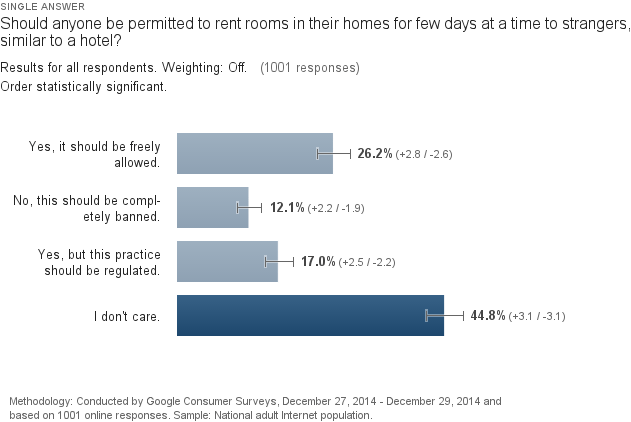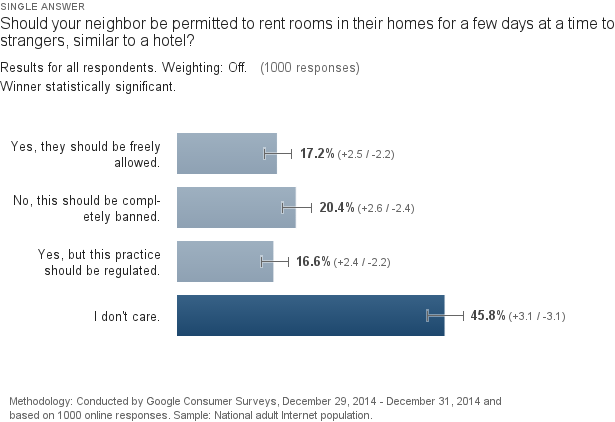Skift Take
Everyone loves the concept of the sharing economy, but when it comes close to home, feelings about it are a lot more nuanced. Lots more research needs to be done at the local and neighborhood level on the effects of the sharing economy, positive and negative.
America is OK with people renting out their homes, a la Airbnb.
That’s the general big headline from two Skift Surveys we did recently, and should be heartening for the company and others in the space as well. After all, this is 2015, Uber and Airbnb are now household names in America.
But, an interesting wrinkle to it: When asked about whether your neighbor should be allowed to rent rooms in their houses for the short term — as opposed to a more general “anyone” — almost 10 percent more Americans change their mind about it, calling for either complete banning of the practice or tighter regulation.
Question 1: Should anyone be permitted to rent rooms in their homes for few days at a time to strangers, similar to a hotel?
Question 2: Should your neighbor be permitted to rent rooms in their homes for a few days at a time to strangers, similar to a hotel?
Digging a bit deeper in the demographics:
- As we look at male vs female behavior, only 10 percent of American men want short-term room renting to be banned, but when asked about their neighbors, that opposition number doubles up to 20 percent. For females, that number goes from 18 percent to 25 percent opposition, a full quarter of women in America.
- On the age group, as Americans mature into youth and family age (25-54), they go from about 8-9 percent complete opposition to short-term rentals to 3 to 4 times that figure when you add their own neighbors into that equation. This shows the crux of the problem with these short-term rentals, especially in crowded cities like New York City where building residents resent strangers coming in and out of them on a regular basis.
- By U.S. region, U.S. West seems to be most open to the concept of short term rentals, a full 30 percent say it should be freely allowed, compared to Northeast where only 17.5 percent say so. But when “your neighbor” factor is introduced, the West’s openness to short-term rentals drops by about half.
- Suburban America is least open to the concept of short term rentals overall, and when you introduce “your neighbor” factor, that opposition doubles up. As might be surmised, Urban America is most open to the concept.
- Richer Americans, those earning $100K and above, are most opposed to short-term rentals, compared to other income brackets, which plays into Airbnb’s general marketing pitch: we’re helping the small guy earn some extra income.
- When it comes to parents vs non-parents, the difference is huge. Only 5 percent of American parents want free rein of short-term rentals and when the “your neighbor” factor is introduced, that number only rises to 10 percent. About 30 percent of non-parents, meanwhile, are open to the idea of short-term rentals, but when it comes to their own neighbors doing that, surprisingly, 20 percent want it completely banned, same as the parents in America.
Full results from the two Google Consumer surveys, here and here.
Important: Each of these two surveys — not served to Skift users — was administered to about 1000+ members of the U.S. adult internet population in the last week of Dec 2014, through Google Consumer Surveys. The methodology is explained here.
Dwell Newsletter
Get breaking news, analysis and data from the week’s most important stories about short-term rentals, vacation rentals, housing, and real estate.
Have a confidential tip for Skift? Get in touch
Tags: airbnb, sharing economy, skiftasks, surveys
Photo credit: Not in my neighborhood! Sorta.


